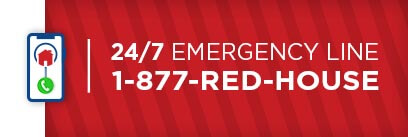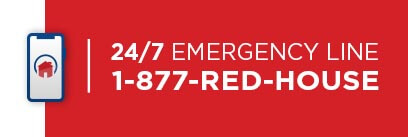
Your roofing system is one of the most important features of your home. It offers protection against harsh elements, adds aesthetic appeal and can play a major role in your home value. Since a roof replacement is a big investment, it’s important to make sure you understand your warranty options. Having the right warranty is essential to ensure you are covered in case the roofing system fails due to defective products or poor installation. Having a reputable contractor install your roof per manufacturer guidelines is also imperative.
Each installation and each product is unique. Warranties can vary. Your contractor should provide you with all of the product warranty information and options upfront. Be sure to read the fine print carefully. Discuss your options with your contractor before making a decision. Knowing what warranty comes with your new roof and being aware can save you a lot of hassle and headache down the road. At Home Repair, we educate you on your options, every step of the way!
It’s important to know what a warranty is. A warranty is a legal statement that limits issuer liability for any failure to perform the issuer’s product or service. A warranty is not insurance, nor is it a maintenance agreement.
2 Types of Roofing Warranties
1. Manufacturer Warranties
This warranty is non-negotiable, so it’s important to understand what it covers and review the lingo with your contractor. The Manufacturer Warranty is provided by the manufacturer of the roofing material and guarantees your roof against material defects or failures. This can be void if it’s not installed properly. This is another reason why it’s so important to use a licensed general and licensed roofing contractor on your project.
2. Contractor or Workmanship Warranties
This warranty is provided by the contractor that installed your roof, and guarantees the installation and workmanship. Contractor Warranties typically last two to five years, and in some cases may be negotiable.
8 Frequently Asked Questions About Roofing Warranties
1. What’s covered in my roof warranty?
Coverage from defects in workmanship and materials is typically covered. If there is a manufacturer defect, or faulty installation, the manufacturer or installation company is responsible to remedy the issue.
2. What’s not covered in my warranty?
A roof warranty usually excludes things you might expect to be covered, such as damage to the interior caused by a roof leak. Issues that may be excluded from coverage can include disasters; interior damage; Acts of God; weather-related damage from water, wind, hail; or subpar roof repairs and alterations. To be prepared, make sure you thoroughly review your warranty options, get routine inspections and ensure you’re conducting proper maintenance.
3. How is value calculated over time?
Often, warranties cover only the depreciated value of your roof, which means less money is paid towards replacement the older your roof is. It’s important to ask about proration associated with your warranty. The exponential decrease in value of the roof over time may be factored.
4. How long does the warranty last?
Typically, the Manufacturer Warranty ranges from 20 to 50 years, while the Contractor Warranty ranges one to five years, with options for upgrades. Expiration dates can vary, so be sure to check.
5. If I sell my home, is my warranty transferable?
In most cases, the homeowner who had the roof installed is the only person entitled to the warranty benefits. Sometimes, transferrable warranties are offered. If you plan to sell your home in the near future, inquire about this option. If you’re a new homeowner and you have a transferable warranty in your contract, know that the previous owner may be required to notify of the transfer within a certain time limit of the sale, in order to ensure that transfer is honored.
6. Does my warranty have any exclusions?
Yes! Some exclusions include disasters; Acts of God; weather-related damage from water, wind, hail; or subpar roof repairs and alterations. A manufacturer might only warranty certain materials, i.e. asphalt shingles, and may require specific installation methodologies per manufacturer. If you had shoddy repairs from an inexperienced or unlicensed contractor that compromised the integrity of your roof, this can void your warranty. In some cases, there may also be exceptions based on where you live or who installed your roof. It’s important to discuss these details with your roofing or general contractor installing your new roofing system.
7. What do I do if there’s an issue and I’m still under warranty?
Contact your manufacturer and the contractor who installed your roof if you suspect there’s an issue.
8. Can my warranty be cancelled?
The easiest way to void your warranty is to put off maintaining it. Regular maintenance by an approved contractor is crucial if you want to keep your warranty valid. It’s recommended to get a roof inspection at least twice a year. To keep your warranty intact, be sure to choose a licensed roofing contractor who has references, testimonials and a stellar reputation for quality workmanship.
Damaged, Destroyed, Or Just Tired...We’ll Get It Back to Beautiful!
At Home Repair, we provide an array of options to ensure the lifespan and longevity of your new roofing system. As a licensed general contractor with over 30 years of experience, our expert team provides a range of services including roofing replacements, installation, repairs, solar roofing, storm damage restoration, solar roofing, maintenance programs, siding, gutters, windows and more! Whether your home or business is damaged, destroyed, or just tired, we provide full-scope, comprehensive property inspections including photos, bids, scope of work, damage assessments, manufacturer/product options and warranty recommendations. We proudly utilize the best materials and latest technology to provide the most advanced level of service to our customers.




